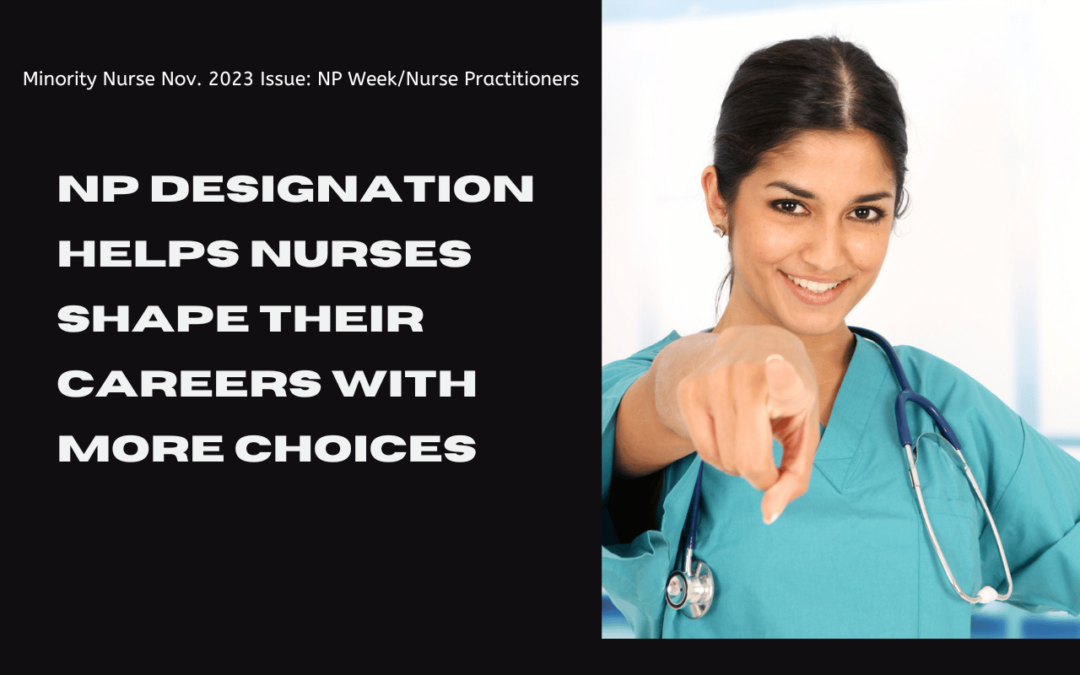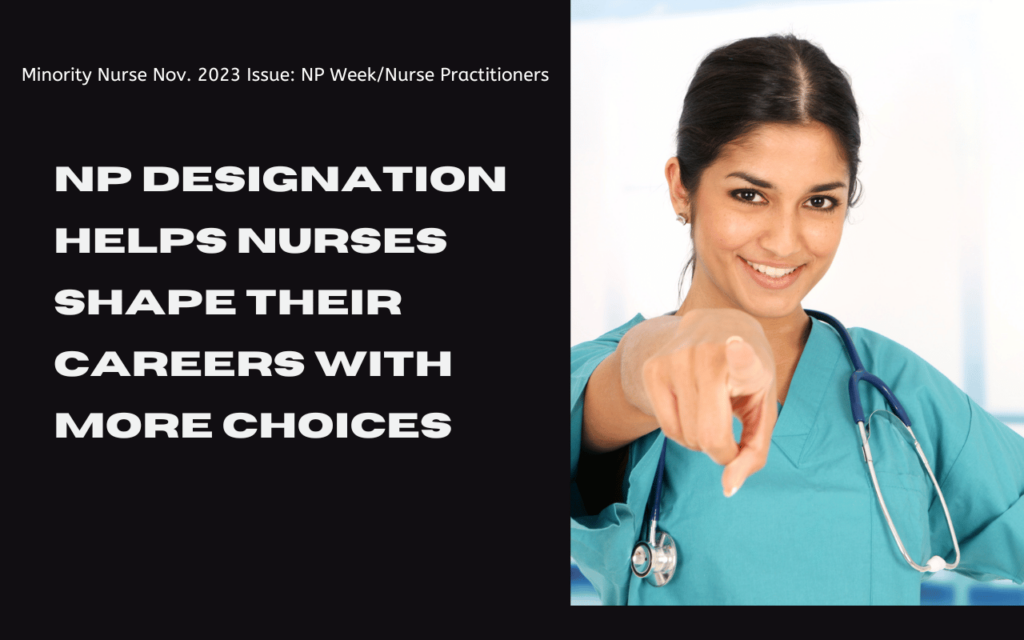Earning an advanced degree offers nurses immediate career benefits, including skills and knowledge they’ll apply to their work long before graduation. But advanced degrees, including the designation as a nurse practitioner (NP), also offer study nuances that propel careers forward and present opportunities that weren’t available before.
Nurses who pursue an NP with a master’s of nursing degree find, in particular, that the additional credential offers a level of autonomy leading to career paths that could include direct patient care, nurse leadership roles, research, business, academia, or the diverse potential in entrepreneurship.
As nurse practitioners branch out to explore entrepreneurial pursuits, new roles that blend bedside and leadership, or new research models, the beneficial impacts on public health and approaches to healthcare are widely visible.
“The NP workforce is in a constant state of growth
to keep up with the rising demands of the healthcare system,” says Paula Tucker, DNP, FNP-BC, ENP-C, FAANP Clinical Associate Professor and Interim Director of the Emergency Nurse Practitioner Program Nell Hodgson Woodruff School of Nursing, Emory University. “NPs frequently operate in regions where access to healthcare services is limited and providing care to vulnerable populations. This experience equips NPs with invaluable skills for providing care to diverse patient groups and addressing healthcare disparities.”The COVID pandemic brought significant changes to the nursing practice and workforce and, in many ways, paved the way for NPs to expand their career paths. And because their experience and expertise were crucial to in-the-moment patient care scenarios, public awareness about nurse practitioners increased. “NPs have demonstrated their leadership capabilities by pioneering innovative care models that adapt to these changes,” says Tucker, who also holds a volunteer leadership position for the American Association of Nurse Practitioners. “This experience in healthcare innovation is an asset for nurses contemplating diverse career avenues.”
Miranda High MSN, APRN, FNP-C, works as a Certified Mobile Research Nurse/CMRN and a nurse practitioner for PCM Trials. When she started on a nursing path, High says becoming a nurse practitioner was her goal because it would allow her to work as a provider. Working as a mobile research nurse wasn’t a path she was initially aware of. “I thought this was a role where I could potentially help people have access to treatment options that they may not otherwise have due to several factors, including traveling restrictions and financial obstacles preventing people from making follow-up visits at the site,” says High. “I felt like being able to take ‘the site’ to them allowed them the ability to be a participant in a clinical trial to not only help themselves but to be part of something bigger than just themselves. Being part of something that could potentially help so many other people in the future was what led me to discover the excitement of this role.”
Tucker says that identifying goals, developing a passion for a specialty, and gaining new skills are all effectively leveraged in diverse roles. “The key is to find one’s passion in caring for patients and allowing that passion to drive creativity, giving back to the community, and fostering innovation as a change agent in healthcare,” she says.
Alita-Geri Carter, MSN, RN, CPNP-PC CEO and founder of The Commission for Health, LLC, says she decided to become an NP when she was 14, a path that began when her younger sister spent weeks in NICU. Carter’s entrepreneurial approach allows her to provide various nursing services rooted in her passion. “Nursing is a significant part of who I am, and my nursing perspective also plays a critical role in each decision I make,” she says. As a nurse entrepreneur, you must be able to pivot and meet the needs of your consumers to remain relevant.” Carter has shaped a career that lets her use her nursing skills to provide patient advocacy and resource coordination education, healthcare provider and school-based provider training, curriculum development, public speaking, communications and public relations consultant services, and legislative advocacy for children and youth with special healthcare needs.
For High, a mobile research nursing role brings her into the homes of subjects participating in a clinical trial, and needs follow-up data obtained as required in-home visits. “On these follow-up visits, any number of nursing tasks can be performed, including labs, EKG, obtaining information, reviewing logs, etc.,” she says. In High’s other role, as an NP with PCM, she is part of the clinical interview team conducting clinical interviews with potential NPs to discuss clinical competencies since the initial recruiters are not clinically trained. “We discuss their skills and abilities as they relate to the nurse practitioner’s scope of practice,” she says. “After the candidate interview, I help to determine if they are eligible for hire based on their clinical competencies.”
According to Tucker, the NP credential means nurses have experience with using advanced clinical skills, making complex medical decisions, and, particularly, developing effective communication with patients, which fosters teamwork and interprofessional collaboration. Both High and Carter say the NP expanded their career options. Because the NP background gave her an understanding of how to interpret the patient findings she was reporting to physicians as a registered nurse, High says being an NP has helped her expand on how she helps people and the number of kinds of people she can serve. “It gave me the opportunity to potentially be a provider to people to the underserved community who may not have access to care in any other way,” she says. “As an NP, I can help them with preventative and chronic health needs in a way that many MDs do not practice. I firmly believe that having my NP allows me to bridge the gap in healthcare disparities.”
Carter’s entrepreneurial approach relies on the NP’s experience as a provider with prescribing, diagnosing, and authorization responsibilities. “I can understand the healthcare system more intimately,” she says. “There is something to be said about the firsthand experience. I have the unique experience of working as a nursing assistant, registered nurse, nursing administrator, and nurse practitioner. It creates a well-rounded perspective of patient care, outcomes, provider scope, and access.”
Nurse practitioners can open doors they never knew existed, and that’s often a starting point to a meaningful career. “The NP path offers a gateway to a world of opportunities,” says Tucker. “Being part of a community of NPs who serve as catalysts for change within the healthcare system facilitates personal and professional growth, positively impacting the lives of patients, families, and communities. For nurses considering this path, being part of a trusted profession, the ability to adapt to various healthcare settings, experience in serving diverse populations, and contributing to innovative healthcare interventions makes it an immensely promising and fulfilling career choice.”
- Is the FNP Program Right for You? - April 24, 2024
- WOC Nurses Week Highlights Specialty - April 16, 2024
- Honoring Radiology Nurses Day on April 12 - April 12, 2024




